2014年福建省高考英语试卷及答案
- 格式:doc
- 大小:1.84 MB
- 文档页数:8
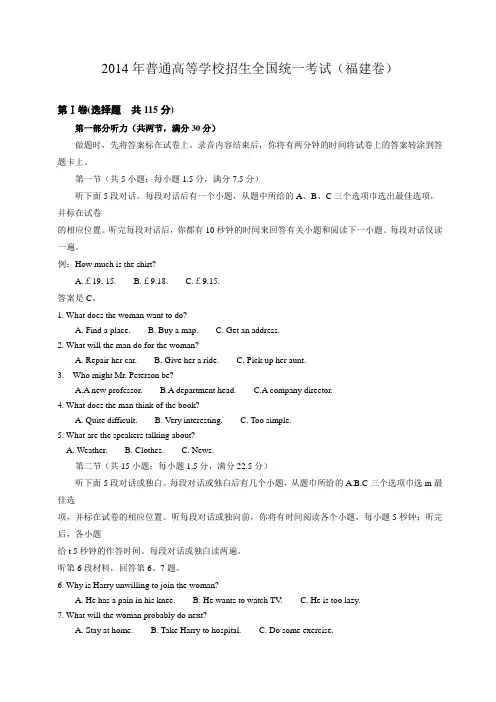
2014年普通高等学校招生全国统一考试(福建卷)第Ⅰ卷(选择题共115分)第一部分听力(共两节,满分30分)做题时,先将答案标在试卷上。
录音内容结束后,你将有两分钟的时间将试卷上的答案转涂到答题卡上。
第一节(共5小题;每小题1.5分,满分7.5分)听下面5段对话。
每段对话后有一个小题,从题中所给的A、B、C三个选项巾选出最佳选项,并标在试卷的相应位置。
听完每段对话后,你都有10秒钟的时间来回答有关小题和阅读下一小题。
每段对话仅读一遍。
例:How much is the shirt?A.£19. 15.B.£9.18.C.£9.15.答案是C。
1. What does the woman want to do?A. Find a place.B. Buy a map.C. Get an address.2. What will the man do for the woman?A. Repair her car.B. Give her a ride.C. Pick up her aunt.3. Who might Mr. Peterson be?A.A new professor.B.A department head.C.A company director.4. What does the man think of the book?A. Quite difficult.B. Very interesting.C. Too simple.5. What are the speakers talking about?A. Weather.B. Clothes.C. News.第二节(共15小题;每小题1.5分,满分22.5分)听下面5段对话或独白。
每段对话或独白后有几个小题,从题巾所给的A.B.C三个选项巾选m最佳选项,并标在试卷的相应位置。
听每段对话或独向前,你将有时间阅读各个小题,每小题5秒钟;听完后,各小题给t 5秒钟的作答时间。
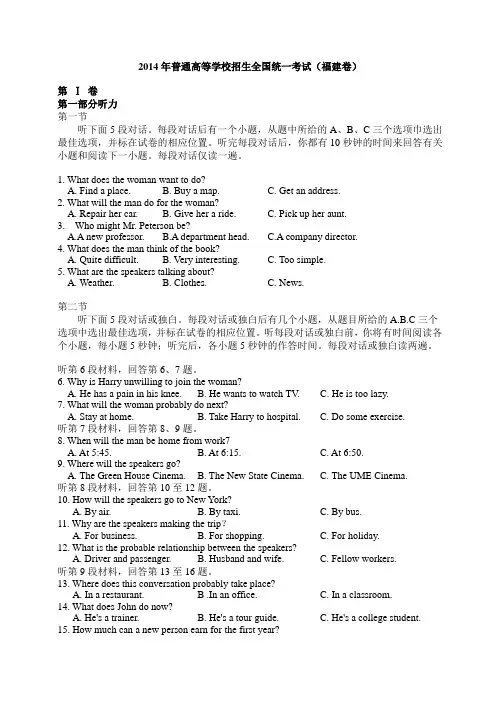
2014年普通高等学校招生全国统一考试(福建卷)第Ⅰ卷第一部分听力第一节听下面5段对话。
每段对话后有一个小题,从题中所给的A、B、C三个选项巾选出最佳选项,并标在试卷的相应位置。
听完每段对话后,你都有10秒钟的时间来回答有关小题和阅读下一小题。
每段对话仅读一遍。
1. What does the woman want to do?A. Find a place.B. Buy a map.C. Get an address.2. What will the man do for the woman?A. Repair her car.B. Give her a ride.C. Pick up her aunt.3. Who might Mr. Peterson be?A.A new professor.B.A department head.C.A company director.4. What does the man think of the book?A. Quite difficult.B. Very interesting.C. Too simple.5. What are the speakers talking about?A. Weather.B. Clothes.C. News.第二节听下面5段对话或独白。
每段对话或独白后有几个小题,从题目所给的A.B.C三个选项中选出最佳选项,并标在试卷的相应位置。
听每段对话或独白前,你将有时间阅读各个小题,每小题5秒钟;听完后,各小题5秒钟的作答时间。
每段对话或独白读两遍。
听第6段材料,回答第6、7题。
6. Why is Harry unwilling to join the woman?A. He has a pain in his knee.B. He wants to watch TV.C. He is too lazy.7. What will the woman probably do next?A. Stay at home.B. Take Harry to hospital.C. Do some exercise.听第7段材料,回答第8、9题。
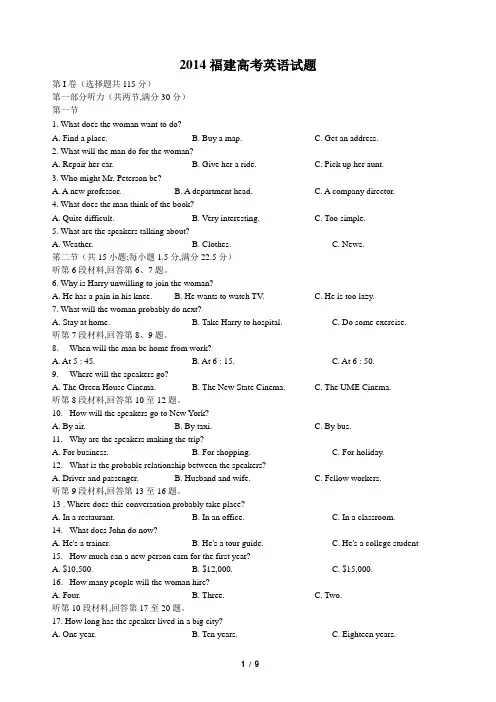
2014福建高考英语试题第I卷(选择题共115分)第一部分听力(共两节,满分30分)第一节1. What does the woman want to do?A. Find a place.B. Buy a map.C. Get an address.2. What will the man do for the woman?A. Repair her car.B. Give her a ride.C. Pick up her aunt.3. Who might Mr. Peterson be?A. A new professor.B. A department head.C. A company director.4. What does the man think of the book?A. Quite difficult.B. Very interesting.C. Too simple.5. What are the speakers talking about?A. Weather.B. Clothes.C. News.笫二节(共15小题;每小题1.5分,满分22.5分)听第6段材料,回答第6、7题。
6. Why is Harry unwilling to join the woman?A. He has a pain in his knee.B. He wants to watch TV.C. He is too lazy.7. What will the woman probably do next?A. Stay at home.B. Take Harry to hospital.C. Do some exercise.听第7段材料,回答第8、9题。
8. When will the man be home from work?A. At 5 : 45.B. At 6 : 15.C. At 6 : 50.9. Where will the speakers go?A.The Green House Cinema.B. The New State Cinema.C. The UME Cinema.听第8段材料,回答第10至12题。
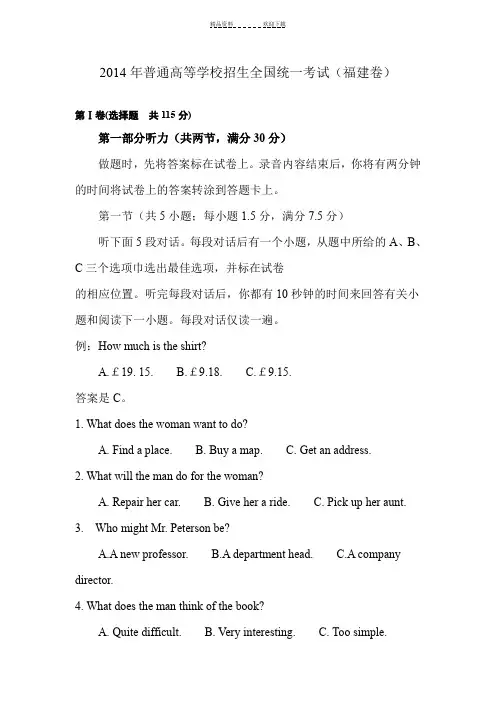
2014年普通高等学校招生全国统一考试(福建卷)第Ⅰ卷(选择题共115分)第一部分听力(共两节,满分30分)做题时,先将答案标在试卷上。
录音内容结束后,你将有两分钟的时间将试卷上的答案转涂到答题卡上。
第一节(共5小题;每小题1.5分,满分7.5分)听下面5段对话。
每段对话后有一个小题,从题中所给的A、B、C三个选项巾选出最佳选项,并标在试卷的相应位置。
听完每段对话后,你都有10秒钟的时间来回答有关小题和阅读下一小题。
每段对话仅读一遍。
例:How much is the shirt?A.£19. 15.B.£9.18.C.£9.15.答案是C。
1. What does the woman want to do?A. Find a place.B. Buy a map.C. Get an address.2. What will the man do for the woman?A. Repair her car.B. Give her a ride.C. Pick up her aunt.3. Who might Mr. Peterson be?A.A new professor.B.A department head.C.A company director.4. What does the man think of the book?A. Quite difficult.B. Very interesting.C. Too simple.5. What are the speakers talking about?A. Weather.B. Clothes.C. News.第二节(共15小题;每小题1.5分,满分22.5分)听下面5段对话或独白。
每段对话或独白后有几个小题,从题巾所给的A.B.C三个选项巾选m最佳选项,并标在试卷的相应位置。
听每段对话或独向前,你将有时间阅读各个小题,每小题5秒钟;听完后,各小题给t 5秒钟的作答时间。
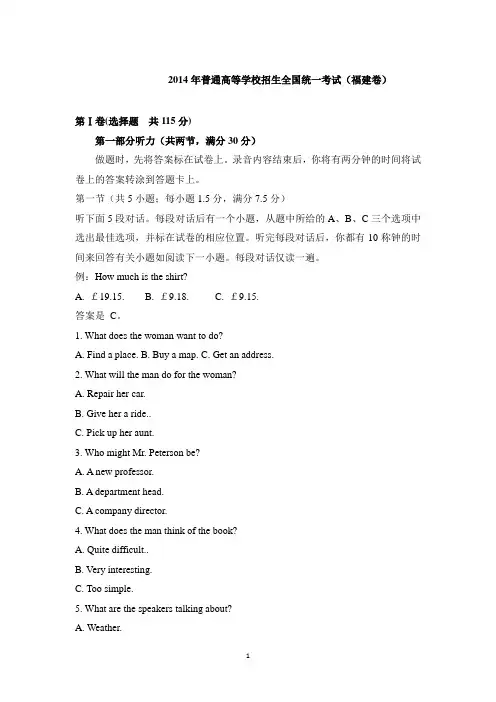
2014年普通高等学校招生全国统一考试(福建卷)第Ⅰ卷(选择题共115分)第一部分听力(共两节,满分30分)做题时,先将答案标在试卷上。
录音内容结束后,你将有两分钟的时间将试卷上的答案转涂到答题卡上。
第一节(共5小题;每小题1.5分,满分7.5分)听下面5段对话。
每段对话后有一个小题,从题中所给的A、B、C三个选项中选出最佳选项,并标在试卷的相应位置。
听完每段对话后,你都有10称钟的时间来回答有关小题如阅读下一小题。
每段对话仅读一遍。
例:How much is the shirt?A. £19.15.B. £9.18.C. £9.15.答案是C。
1. What does the woman want to do?A. Find a place.B. Buy a map.C. Get an address.2. What will the man do for the woman?A. Repair her car.B. Give her a ride..C. Pick up her aunt.3. Who might Mr. Peterson be?A. A new professor.B. A department head.C. A company director.4. What does the man think of the book?A. Quite difficult..B. Very interesting.C. Too simple.5. What are the speakers talking about?A. Weather.B. Clothes.C. News.第二节(共15小题;每小题1.5分,满分22.5分)听下面5段对话或独白。
每段对话或独白后有几个小题,从题中所给的A、B、C三个选项中选出最佳选项,并标在试卷的相应位置。
听每段对话或独白前,你将有时间阅读各个小题,每小题5秒钟;听完后,各小题将给出5秒钟的作答时间。

福建高考英语卷及答案 YKK standardization office【 YKK5AB- YKK08- YKK2C- YKK18】2014年福建高考英语卷及答案第I卷选择题(满分115分)第一部分听力(满分30分)省略第二部分英语知识运用(共两节,满分45分)第一节单项填空(共15小题;每小题1分,满分15分)从、C、D四个选项中,选出可以填人空白处的最佳选项,并在答题卡上将该项涂黑。
例:It is generally considered unwise to give a child he or she wants.A. howeverB. whateverC. whicheverD. whenever答案是B。
21. In some countries, people eat with chopsticks, while in , knives and forks.A. anotherB. othersC. bothD. all22. Our club is open to everyone ____ age, sex or educational background.A. due toB. except forC. along withD. regardless of23.—Haven't seen you for ages! Where have you been?—I went to Ningxia and there for one year, teaching as a volunteer.A. stayedB. stayC. had stayedD. am staying24. With online shopping increasingly popular, the Internet is seen as a(n) way of reaching target customers.A. temporaryB. complexC. accurateD. efficient25. It is widely acknowledged that students should be in terms of overall quality.A. supportedB. matchedC. evaluatedD. controlled26. —Could you tell me the____ of making such tasty cakes?— Well, I just follow the direct i ons in the cookbook.A. featureB. planC. costD. trick27. the past year as an exchange student in Hong Kong, Linda appears more mature than those of her age.A. SpendingB. SpentC. Having spentD. To spend28. The climate here is quite pleasant, the temperature rarely, , reaching 300C in summer.A. if notB. if everC. if anyD. if so29. It was the culture, rather than the language, ____made it hard for him to adapt to the new environment abroadA. whereB. whyC. thatD. what30. For those with family members far away, the personal computer and the phone are important in staying________.A. connectedB. connectingC. to connectD. to be connected31. Students should involve themselves in community activities they can gain experience for growth.A. whoB. whenC. whichD. where32. no modern telecommunications, we would have to wait for weeks to get news from around the world.A. Were thereB. Had there been C .If there are D. If there have been33. As a grassroots singer, she reads everything she can concerning music, and takes every opportunity to improve herself.A. catch sight ofB. get hold ofC. take charge ofD. make mention of34. Pick yourself up. Courage is doing you're afraid to do.A. thatB. whatC. howD. whether35. —I can't remember those grammar rules!—__________. Practice more.A. You're not aloneB. It's hard to sayC. I'm afraid notD. It's up to you第二节完形填空(共20小题;每小题分,满分30分)阅读下面短文,从短文后各题所给的四个选项(A、B、C和D)中,选出可以填入空白处的最佳选项。
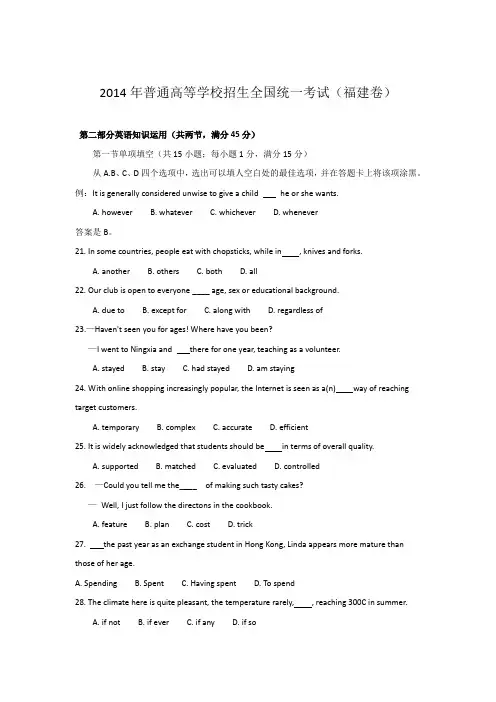
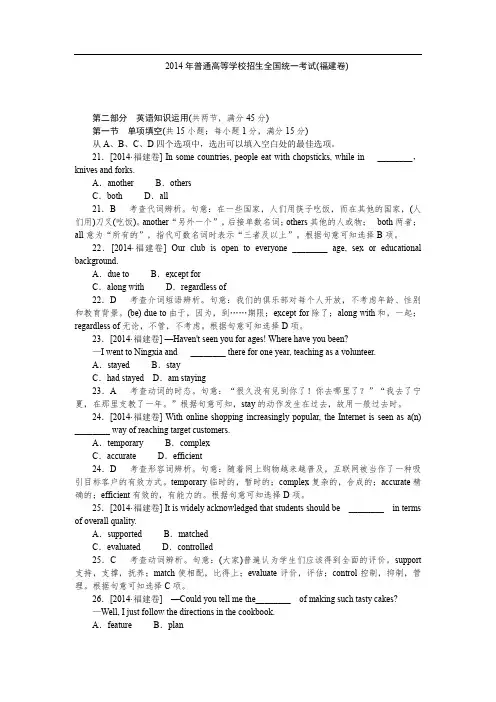
2014年普通高等学校招生全国统一考试(福建卷)第二部分英语知识运用(共两节,满分45分)第一节单项填空(共15小题;每小题1分,满分15分)从A、B、C、D四个选项中,选出可以填入空白处的最佳选项。
21.[2014·福建卷] In some countries, people eat with chopsticks, while in ________,knives and forks.A.another B.othersC.both D.all21.B考查代词辨析。
句意:在一些国家,人们用筷子吃饭,而在其他的国家,(人们用)刀叉(吃饭)。
another“另外一个”,后接单数名词;others其他的人或物;both两者;all意为“所有的”,指代可数名词时表示“三者及以上”。
根据句意可知选择B项。
22.[2014·福建卷] Our club is open to everyone ________ age, sex or educational background.A.due to B.except forC.along with D.regardless of22.D考查介词短语辨析。
句意:我们的俱乐部对每个人开放,不考虑年龄、性别和教育背景。
(be) due to由于,因为,到……期限;except for除了;along with和,一起;regardless of无论,不管,不考虑。
根据句意可知选择D项。
23.[2014·福建卷] —Haven't seen you for ages! Where have you been?—I went to Ningxia and ________ there for one year, teaching as a volunteer.A.stayed B.stayC.had stayed D.am staying23.A考查动词的时态。
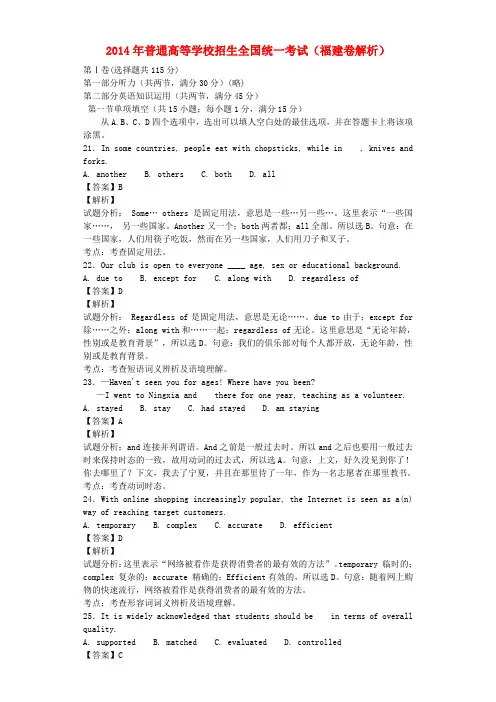
2014年普通高等学校招生全国统一考试(福建卷解析)第Ⅰ卷(选择题共115分)第一部分听力(共两节,满分30分)(略)第二部分英语知识运用(共两节,满分45分)第一节单项填空(共15小题;每小题1分,满分15分)从A.B、C、D四个选项中,选出可以填人空白处的最佳选项,并在答题卡上将该项涂黑。
21.In some countries, people eat with chopsticks, while in , knives and forks.A. anotherB. othersC. bothD. all【答案】B【解析】试题分析:Some… others是固定用法,意思是一些…另一些…。
这里表示“一些国家……,另一些国家。
Another又一个;both两者都;all全部。
所以选B。
句意:在一些国家,人们用筷子吃饭,然而在另一些国家,人们用刀子和叉子。
考点:考查固定用法。
22.Our club is open to everyone ____ age, sex or educational background.A. due toB. except forC. along withD. regardless of【答案】D【解析】试题分析: Regardless of是固定用法,意思是无论……。
due to由于;except for 除……之外;along with和……一起;regardless of无论。
这里意思是“无论年龄,性别或是教育背景”,所以选D。
句意:我们的俱乐部对每个人都开放,无论年龄,性别或是教育背景。
考点:考查短语词义辨析及语境理解。
23.—Haven't seen you for ages! Where have you been?—I went to Ningxia and there for one year, teaching as a volunteer. A. stayed B. stay C. had stayed D. am staying【答案】A【解析】试题分析:and连接并列谓语。
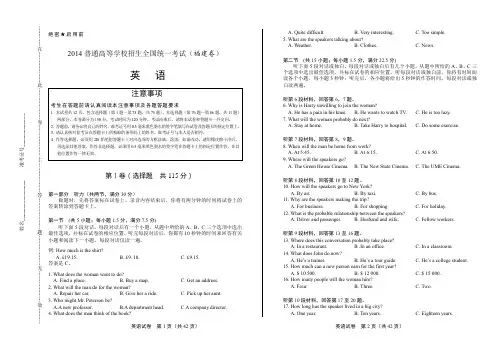
英语试卷 第1页(共42页)英语试卷 第2页(共42页)绝密★启用前2014普通高等学校招生全国统一考试(福建卷)英语注意事项考生在答题前请认真阅读本注意事项及各题答题要求1. 本试卷共12页,包含选择题(第1题~第75题,共75题)、非选择题(第76题~第86题,共11题)两部分。
本卷满分为150分,考试时间为120分钟。
考试结束后,请将本试卷和答题卡一并交回。
2. 答题前,请务必将自己的姓名、准考证号用0.5毫米黑色墨水的签字笔填写在试卷及答题卡的规定位置上。
3. 请认真核对监考员在答题卡上所粘贴的条形码上的姓名、准考证号与本人是否相符。
4. 作答选择题,必须用2B 铅笔把答题卡上对应选项的方框涂满、涂黑;如需改动,请用橡皮擦干净后,再选涂其他答案。
作答非选择题,必须用0.5毫米黑色墨水的签字笔在答题卡上的指定位置作答,在其他位置作答一律无效。
第Ⅰ卷(选择题 共115分)第一部分 听力(共两节,满分30分)做题时,先将答案标在试卷上。
录音内容结束后,你将有两分钟的时间将试卷上的答案转涂到答题卡上。
第一节 (共5小题;每小题1.5分,满分7.5分)听下面5段对话。
每段对话后有一个小题,从题中所给的A 、B 、C 三个选项中选出最佳选项,并标在试卷的相应位置。
听完每段对话后,你都有10秒钟的时间来回答有关小题和阅读下一小题。
每段对话仅读一遍。
例: How much is the shirt? A. £19.15. B. £9. 18.C. £9.15.答案是C 。
1. What does the woman want to do?A. Find a place.B. Buy a map.C. Get an address. 2. What will the man do for the woman? A. Repair her car. B. Give her a ride. C. Pick up her aunt. 3. Who might Mr. Peterson be? A.A new professor. B.A department head.C.A company director.4. What does the man think of the book?A. Quite difficult.B. Very interesting.C. Too simple. 5. What are the speakers talking about? A. Weather. B. Clothes.C. News.第二节 (共15小题;每小题1.5分,满分22.5分)听下面5段对话或独白。
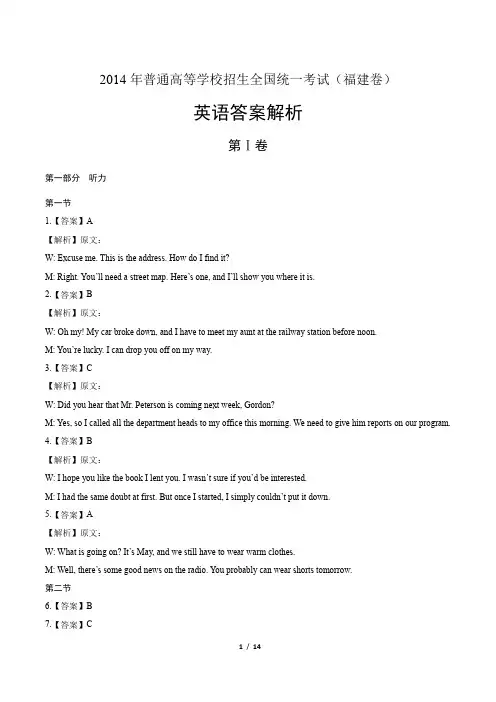
2014年普通高等学校招生全国统一考试(福建卷)英语答案解析第Ⅰ卷第一部分听力第一节1.【答案】A【解析】原文:W: Excuse me. This is the address. How do I find it?M: Right. You’ll need a street map. Here’s one, and I’ll show you where it is.2.【答案】B【解析】原文:W: Oh my! My car broke down, and I have to meet my aunt at the railway station before noon.M: You’re lucky. I can drop you off on my way.3.【答案】C【解析】原文:W: Did you hear that Mr. Peterson is coming next week, Gordon?M: Yes, so I called all the department heads to my office this morning. We need to give him reports on our program.4.【答案】B【解析】原文:W: I hope you like the book I lent you. I wasn’t sure if you’d be interested.M: I had the same doubt at first. But once I started, I simply couldn’t put it down.5.【答案】A【解析】原文:W: What is going on? It’s May, and we still have to wear warm clothes.M: Well, there’s some good news on the radio. You probably can wear shorts tomorrow.第二节6.【答案】B7.【答案】CW: Harry, let’s play some ping-pong today.M: I’d love to play a set or two, but my right arm hurts. I’ve decided to stop playing ping-pong until it feels better. W: Well, how about going skating?M: I’d like to, but my knee hurts, too.W: Harry, stop making excuses! You’re just lazy.M: No, I’m not! You know, there’s a basketball match on TV today. Let’s just stay home and watch it.W: OK. You stay, and I’ll play with Helen.8.【答案】A【解析】原文:W: What do you want to do tonight?M: How about going to the cinema? I should be home from work at 5:45. Then we can go out and eat before we see a film.W: What do you want to see?M: There’s a good art film at the Green House Cinema.W: Let’s see…it starts at 6:15. I don’t think we can get there in time to see the beginning. How about the action film at the New State Cinema? It starts at 6:50. Perhaps the 7:00 one at the UME Cinema is even better. It stars Jackie Chan.M: OK, that’s fine. I like him, too.9.【答案】C【解析】原文:W: What do you want to do tonight?M: How about going to the cinema? I should be home from work at 5:45. Then we can go out and eat before we see a film.W: What do you want to see?M: There’s a good art film at the Green House Cinema.W: Let’s see…it starts at 6:15. I don’t think we can get there in time to see the beginning. How about the action film at the New State Cinema? It starts at 6:50. Perhaps the 7:00 one at the UME Cinema is even better. It stars Jackie Chan.M: OK, that’s fine. I like him, too.10.【答案】AM: Hey, Lucy. Do you have some time to talk about next week’s trip with me?W: Sure, Dave.M: OK. So, we’re leaving on Monday from Hartsfield International Airport, and returning on Friday. Do we take ourselves to the airport? Maybe we need to book a taxi, or just go by bus.W: No, we don’t have to. The company car will pick us up and take us there.M: Oh, that’s good. When?W: Our flight leaves at 11:00 a.m., so they should pick us up between 8:00 and 9:00 a.m. Besides, the company pays for our trip, including hotel and food.M: How much will that be?W: Well, New York is a pretty expensive city. So, each of us will get $200 a day.M: Oh, OK. Thanks for telling me that.W: You’re welcome.11.【答案】A【解析】原文:M: Hey, Lucy. Do you have some time to talk about next week’s trip with me?W: Sure, Dave.M: OK. So, we’re leaving on Monday from Hartsfield International Airport, and returning on Friday. Do we take ourselves to the airport? Maybe we need to book a taxi, or just go by bus.W: No, we don’t have to. The company car will pick us up and take us there.M: Oh, that’s good. When?W: Our flight leaves at 11:00 a.m., so they should pick us up between 8:00 and 9:00 a.m. Besides, the company pays for our trip, including hotel and food.M: How much will that be?W: Well, New York is a pretty expensive city. So, each of us will get $200 a day.M: Oh, OK. Thanks for telling me that.W: You’re welcome.12.【答案】C【解析】原文:M: Hey, Lucy. Do you have some time to talk about next week’s trip with me?W: Sure, Dave.M: OK. So, we’re leaving on Monday from Hartsfield International Airport, and returning on Friday. Do we take ourselves to the airport? Maybe we need to book a taxi, or just go by bus.W: No, we don’t have to. The company car will pick us up and take us there.M: Oh, that’s good. When?W: Our flight leaves at 11:00 a.m., so they should pick us up between 8:00 and 9:00 a.m. Besides, the company pays for our trip, including hotel and food.M: How much will that be?W: Well, New York is a pretty expensive city. So, each of us will get $200 a day.M: Oh, OK. Thanks for telling me that.W: You’re welcome.13.【答案】B【解析】原文:W: Please sit down. Let’s see…you’re Mr. Smith. Is that correct?M: Yes. John Smith.W: And you’re interested in this job?M: Yes, I am. I’ll graduate from college the coming June. My major is Chinese.W: I see. Have you ever done any work in this field?M: Yes, I used to be a tour guide for Chinese travellers.W: Good. Now, how much money do you expect to have for a year?M: From what I’ve read, it seems that a starting pay would be around $12,000 a year.W: Here, you would start at $10,500 for the first year…a kind of training period. Then you would go to $15,000. M: That sounds fair enough. What do you think are the chances for me to get a job here?W: Well, I’m talking to three people today and four tomorrow. We’ll be hiring two people. You’ll hear from us sometime next month. Good luck! And thanks for coming in today.14.【答案】C【解析】原文:W: Please sit down. Let’s see…you’re Mr. Smith. Is that correct?M: Yes. John Smith.W: And you’re interested in this job?M: Yes, I am. I’ll graduate from college the coming June. My major is Chinese.W: I see. Have you ever done any work in this field?M: Yes, I used to be a tour guide for Chinese travellers.W: Good. Now, how much money do you expect to have for a year?M: From what I’ve read, it seems that a starting pay would be around $12,000 a year.W: Here, you would start at $10,500 for the first year…a kind of training period. Then you would go to $15,000. M: That sounds fair enough. What do you think are the chances for me to get a job here?W: Well, I’m talking to three people today and four tomorrow. We’ll be hiring two people. You’ll hear from us sometime next month. Good luck! And thanks for coming in today.15.【答案】A【解析】原文:W: Please sit down. Let’s see…you’re Mr. Smith. Is that correct?M: Yes. John Smith.W: And you’re interested in this job?M: Yes, I am. I’ll graduate from college the coming June. My major is Chinese.W: I see. Have you ever done any work in this field?M: Yes, I used to be a tour guide for Chinese travellers.W: Good. Now, how much money do you expect to have for a year?M: From what I’ve read, it seems that a starting pay would be around $12,000 a year.W: Here, you would start at $10,500 for the first year…a kind of training period. Then you would go to $15,000. M: That sounds fair enough. What do you think are the chances for me to get a job here?W: Well, I’m talking to three people today and four tomorrow. We’ll be hiring two people. You’ll hear from us sometime next month. Good luck! And thanks for coming in today.16.【答案】C【解析】原文:W: Please sit down. Let’s see…you’re Mr. Smith. Is that correct?M: Yes. John Smith.W: And you’re interested in this job?M: Yes, I am. I’ll graduate from college the coming June. My major is Chinese.W: I see. Have you ever done any work in this field?M: Yes, I used to be a tour guide for Chinese travellers.W: Good. Now, how much money do you expect to have for a year?M: From what I’ve read, it seems that a starting pay would be around $12,000 a year.W: Here, you would start at $10,500 for the first year…a kind of training period. Then you would go to $15,000. M: That sounds fair enough. What do you think are the chances for me to get a job here?W: Well, I’m talking to three people today and four tomorrow. We’ll be hiring two people. You’ll hear from us sometime next month. Good luck! And thanks for coming in today.17.【答案】B【解析】原文:M: Well, I’d love to share with you my personal opinions on city life and life in small towns. I grew up in a small town until I was 18 and then moved to a big city, so I have experienced the good and bad sides of both. I never thought that I would like living in a big city, but I was wrong. After ten years of living in one, I can’t imagine ever living in a small town again. Surely small towns and big cities both have some problems in terms of transport. In a small town, you have to own a car to make life comfortable. You can’t get around without one because there isn’t any kind of public transport. Big cities generally have heavy traffic and expensive parking, but there you have a choice of taking public transport, which is cheaper than driving. So, if you don’t have a car, you’d better live in the city. I also love the exciting life in big cities. I can always enjoy a lot of films, concerts, and other wonderful shows. However, these things are not common in small towns. The final thing I like about large cities is that you can meet different kinds of people. However, you seldom find such a variety of people in a smaller town. I think that living in an area where everyone was just like me would quickly become dull. Of course, safety should be considered, and that’s one area where small towns are better than big cities. Still, I would rather be a bit more careful and live in a large city than to feel safe but dull.18.【答案】C【解析】原文:M: Well, I’d love to share with you my personal opinions on city life and life in small towns. I grew up in a small town until I was 18 and then moved to a big city, so I have experienced the good and bad sides of both. I never thought that I would like living in a big city, but I was wrong. After ten years of living in one, I can’t imagine ever living in a small town again. Surely small towns and big cities both have some problems in terms of transport. In a small town, you have to own a car to make life comfortable. You can’t get around without one because there isn’t any kind of public transport. Big cities generally have heavy traffic and expensive parking, but there you have a choice of taking public transport, which is cheaper than driving. So, if you don’t have a car, you’d better live in the city. I also love the exciting life in big cities. I can always enjoy a lot of films, concerts, and other wonderful shows. However, these things are not common in small towns. The final thing I like about large cities is that you can meet different kinds of people. However, you seldom find such a variety of people in a smaller town. I think that livingin an area where everyone was just like me would quickly become dull. Of course, safety should be considered, and that’s one area where small towns are better than big cities. Still, I would rather be a bit more careful and live in a large city than to feel safe but dull.19.【答案】A【解析】原文:M: Well, I’d love to share with you my personal opinions on city life and life in small towns. I grew up in a small town until I was 18 and then moved to a big city, so I have experienced the good and bad sides of both. I never thought that I would like living in a big city, but I was wrong. After ten years of living in one, I can’t imagine ever living in a small town again. Surely small towns and big cities both have some problems in terms of transport. In a small town, you have to own a car to make life comfortable. You can’t get around without one because there isn’t any kind of public transport. Big cities generally have heavy traffic and expensive parking, but there you have a choice of taking public transport, which is cheaper than driving. So, if you don’t have a car, you’d better live in the city. I also love the exciting life in big cities. I can always enjoy a lot of films, concerts, and other wonderful shows. However, these things are not common in small towns. The final thing I like about large cities is that you can meet different kinds of people. However, you seldom find such a variety of people in a smaller town. I think that living in an area where everyone was just like me would quickly become dull. Of course, safety should be considered, and that’s one area where small towns are better than big cities. Still, I would rather be a bit more careful and live in a large city than to feel safe but dull.20.【答案】B【解析】原文:M: Well, I’d love to share with you my personal opinions on city life and life in small towns. I grew up in a small town until I was 18 and then moved to a big city, so I have experienced the good and bad sides of both. I never thought that I would like living in a big city, but I was wrong. After ten years of living in one, I can’t imagine ever living in a small town again. Surely small towns and big cities both have some problems in terms of transport. In a small town, you have to own a car to make life comfortable. You can’t get around without one because there isn’t any kind of public transport. Big cities generally have heavy traffic and expensive parking, but there you have a choice of taking public transport, which is cheaper than driving. So, if you don’t have a car, you’d better live in the city. I also love the exciting life in big cities. I can always enjoy a lot of films, concerts, and other wonderful shows. However, these things are not common in small towns. The final thing I like about large cities is that you can meet different kinds of people. However, you seldom find such a variety of people in a smaller town. I think that living in an area where everyone was just like me would quickly become dull. Of course, safety should be considered, andthat’s one area where small towns are better than big cities. Still, I would rather be a bit more careful and live in a large city than to feel safe but dull.第二部分英语知识运用第一节单项填空21.【答案】B【解析】Another通常指三者或三者以上中的另外一个,表示泛指;others其他人或物(没有范围限制的);both指两者都…;all指三者或三者以上都…;句义:在一些国家里,人们使用筷子吃饭,而在另外一些国家,人们使用刀叉。
2014年普通高等学校招生全国统一考试 N8福建卷第I 卷第一部分听力第一节1.这位女士想做什么?A 找一个地方B 买一张地图C 得到一个地址2.这位男士将为这位女士做什么?A 修理她的车B 带她一段C 接她的姑姑3.彼得森先生的身份可能是A 大学教授B 系主任C 公司董事4.这位男士认为这本书如何?A.很难B 非常有趣C 太简单了5.说话者在讨论什么?A 天气B 衣服C 新闻第二节听第六段材料回答6,7题6.哈利为什么不愿意加入这位女士?A 他的膝盖疼B 他想看电视C 他太懒了7.这位女士接下来很可能做什么?A 呆在家里B 陪哈利去医院C 做些运动听第七段材料回答8,9题8.这位男士什么时候下班回到家?A 5:45B 6:15C 6:509.说话者们要去哪儿?A 绿房(Green House)影院B 新国家(NEW State)影院C .UME电影院听第八段材料回答10-12题10.说话者们讲怎样去纽约A 乘坐飞机B 坐出租车C 坐公交车11 说话者们这次旅行是为了……?A 业务需要B 购物C 度假12.说话者之间的关系是?A司机和乘客B 夫妻C 同事听第九段材料回答13—16 题13 这段对话很可能发生在哪儿?A 饭店B 公司C 教室14 约翰是做什么的?A 教员B 导游C 大学学生15 新人第一年能赚多少钱?A 10500 美元B 12000美元C 15000美元16 这位女士将雇佣几个人?A 四个B 三个C 两个听第十段材料回答17—20题17. 说话者在大城市住了多久?A 一年B 十年C 十八年18.说话者认为公共交通如何?A 非常舒适B 节省时间C便宜19 住在小城镇的好处是?A 更安全B 更健康C 更便利20 说话者最喜欢什么样的生活?A繁忙B 丰富多彩C 安静第二部分英语知识运用第一节单项填空21.在一些国家,人们用筷子吃饭,而在___人们用刀叉。
A 另一个B 其他国家C 两个都D 所有22.我们的俱乐部对每个人开放___年龄,性别和教育背景A 依据B 除了C 和…一起D 不考虑23 年余未见,去哪儿了?我去了宁夏,在那里___了一年,支教A 呆(过去时)B 呆(现在时)C 过去之前呆D 正呆在24 随着网购的流行,因特网被看做是抵达目标客户一个___的方式A 暂时的B 复杂的C 精确的D 高效的25 大家广泛认同学生应该以学期的整体素质___A 支持B 相配C 评估D 控制26 你能告诉我作出这样好吃的蛋糕的___哦,依照食谱来做A 特征B 计划C 花费,代价D 方法27 作为交换生在香港___一年,琳达比同龄人更成熟A 渡过(现在分词)B 渡过(过去分词)C渡过(现在分词完成式)D 去渡过(动词不定式)28 这儿的气候非常好,温度很少___在夏天到30度A 不然B 很少C 即使D 如果这样29 是文化而不是语言__使他很难适应国外的新环境A …的地方B 为什么C 这件事,指代前文D 什么…的事30 对那些家人彼此离得远的,个人电脑和殿后对保持___很重要A 联系(过去时)B 联系(stay connecting)C 去联系(不定式)D 联系(不定式的被动形式)31 学生应该参加社区活动___他们可以获得成长的经验A …的人B …时候C 在其中D 在某处32 ___没有现代电信,我们要等待数周才能知道世界各地的信息A 假如现在B 假如过去C 如果有D如果有33 作为草根歌手,她阅读一切关于音乐她能够___,并利用一切机会提升自己A 看到B 抓住C 负责D 提到34 振作起来,勇气做了___你害怕去做的事A 无意义B 那个C 怎样D 是否35 我记不住这些语法规则——多练习A 不止你一人这样B 很难说C 我恐怕不行D 到你了第二节完形填空从我上2年级起就有一件我每年都害怕的事,钢琴独奏会。
2014年普通高等学校招生全国统一考试英语试题(福建卷)第Ⅰ卷(选择题共115分)第二部分英语知识运用(共两节,满分45分)第一节单项填空(共15小题;每小题1分,满分15分)从A、B、C、D四个选项中,选出可以填入空白处的最佳选项,并在答题卡上将该项涂黑。
21.In some countries,people eat with chopsticks,while in ______,knives and forks.A.another B.othersC.both D.all22.Our club is open to everyone ______ age,sex or educational background.A.due to B.except forC.along with D.regardless of23.—Haven't seen you for ages!Where have you been?—I went to Ningxia and ______ there for one year,teaching as a volunteer.A.stayed B.stayC.had stayed D.am staying24.With online shopping increasingly popular,the Internet is seen as a(n)______ way of reaching target customers.A.temporary B.complexC.accurate D.efficient25.It is widely acknowledged that students should be ______ in terms of overall quality.A.supported B.matchedC.evaluated D.controlled26.—Could you tell me the ______ of making such tasty cakes?—Well,I just follow the directions in the cookbook.A.feature B.planC.cost D.trick27.______ the past year as an exchange student in Hong Kong,Linda appears more mature than those of her age.A.Spending B.SpentC.Having spent D.To spend28.The climate here is quite pleasant,the temperature rarely,______,reaching 30℃ in summer.A.if not B.if everC.if any D.if so29.It was the culture,rather than the language,______ made it hard for him to adapt to the new environment abroad.A.where B.whyC.that D.what30.For those with family members far away,the personal computer and the phone are important in staying ______.A.connected B.connectingC.to connect D.to be connected31.Students should involve themselves in community activities ______ they can gain experience for growth.A.who B.whenC.which D.where32.______ no modern telecommunications,we would have to wait for weeks to get news from around the world.A.Were there B.Had there beenC.If there are D.If there have been33.As a grassroots singer,she reads everything she can ______ concerning music,and takes every opportunity to improve herself.A.catch sight of B.get hold ofC.take charge of D.make mention of34.Pick yourself up.Courage is doing ______ you're afraid to do.A.that B.whatC.how D.whether35.—I can't remember those grammar rules!—______.Practice more.A.You're not alone B.It's hard to sayC.I'm afraid not D.It's up to you第二节完形填空(共20小题;每小题1.5分,满分30分)阅读下面短文,从短文后各题所给的四个选项(A、B、C和D)中,选出可以填入空白处的最佳选项,并在答题卡上将该项涂黑。
2014年福建高考英语卷及答案第I卷选择题(满分115分)第一部分听力(满分30分)省略第二部分英语知识运用(共两节,满分45分)第一节单项填空(共15小题;每小题1分,满分15分)从、C、D四个选项中,选出可以填人空白处的最佳选项,并在答题卡上将该项涂黑。
例:It is generally considered unwise to give a child he or she wants.A. howeverB. whateverC. whicheverD. whenever答案是B。
21. In some countries, people eat with chopsticks, while in , knives and forks.A. anotherB. othersC. bothD. all22. Our club is open to everyone ____ age, sex or educational background.A. due toB. except forC. along withD. regardless of23.—Haven't seen you for ages! Where have you been?—I went to Ningxia and there for one year, teaching as a volunteer.A. stayedB. stayC. had stayedD. am staying24. With online shopping increasingly popular, the Internet is seen as a(n) way of reaching target customers.A. temporaryB. complexC. accurateD. efficient25. It is widely acknowledged that students should be in terms of overall quality.A. supportedB. matchedC. evaluatedD. controlled26. —Could you tell me the____ of making such tasty cakes?— Well, I just follow the directions in the cookbook.A. featureB. planC. costD. trick27. the past year as an exchange student in Hong Kong, Linda appears more mature than those of her age.A. SpendingB. SpentC. Having spentD. To spend28. The climate here is quite pleasant, the temperature rarely, , reaching 300C in summer.A. if notB. if everC. if anyD. if so29. It was the culture, rather than the language, ____made it hard for him to adapt to the new environment abroadA. whereB. whyC. thatD. what30. For those with family members far away, the personal computer and the phone are important in staying________.A. connectedB. connectingC. to connectD. to be connected31. Students should involve themselves in community activities they can gain experience for growth.A. whoB. whenC. whichD. where32. no modern telecommunications, we would have to wait for weeks to get news from around the world.A. Were thereB. Had there been C .If there are D. If there have been33. As a grassroots singer, she reads everything she can concerning music, and takes every opportunity to improve herself.A. catch sight ofB. get hold ofC. take charge ofD. make mention of34. Pick yourself up. Courage is doing you're afraid to do.A. thatB. whatC. howD. whether35. —I can't remember those grammar rules!—__________. Practice more.A. You're not aloneB. It's hard to sayC. I'm afraid notD. It's up to you第二节完形填空(共20小题;每小题分,满分30分)阅读下面短文,从短文后各题所给的四个选项(A、B、C和D)中,选出可以填入空白处的最佳选项。
高中英语学习材料(灿若寒星*制作整理)2014年普通高等学校招生全国统一考试(福建卷)第Ⅰ卷(选择题共115分)第一部分听力(共两节,满分30分)做题时,先将答案标在试卷上。
录音内容结束后,你将有两分钟的时间将试卷上的答案转涂到答题卡上。
第一节(共5小题;每小题1.5分,满分7.5分)听下面5段对话。
每段对话后有一个小题,从题中所给的A、B、C三个选项巾选出最佳选项,并标在试卷的相应位置。
听完每段对话后,你都有10秒钟的时间来回答有关小题和阅读下一小题。
每段对话仅读一遍。
例:How much is the shirt?A.£19. 15.B.£9.18.C.£9.15.答案是C。
1. What does the woman want to do?A. Find a place.B. Buy a map.C. Get an address.2. What will the man do for the woman?A. Repair her car.B. Give her a ride.C. Pick up her aunt.3. Who might Mr. Peterson be?A.A new professor.B.A department head.C.A company director.4. What does the man think of the book?A. Quite difficult.B. Very interesting.C. Too simple.5. What are the speakers talking about?A. Weather.B. Clothes.C. News.第二节(共15小题;每小题1.5分,满分22.5分)听下面5段对话或独白。
每段对话或独白后有几个小题,从题巾所给的A.B.C三个选项巾选m最佳选项,并标在试卷的相应位置。
听每段对话或独向前,你将有时间阅读各个小题,每小题5秒钟;听完后,各小题给t 5秒钟的作答时间。
2014年福建高考英语卷及答案第I卷选择题〔总分值115分〕第一部分听力〔总分值30分〕省略第二部分英语知识运用〔共两节,总分值45分〕第一节单项填空〔共15小题;每题1分,总分值15分〕从A.B、C、D四个选项中,选出可以填人空白处的最正确选项,并在答题卡上将该项涂黑。
例:It is generally considered unwise to give a child he or she wants.A. howeverB. whateverC. whicheverD. whenever答案是B。
21. In some countries, people eat with chopsticks, while in , knives and forks.A. anotherB. othersC. bothD. all22. Our club is open to everyone ____ age, sex or educational background.A. due toB. except forC. along withD. regardless of23.—Haven't seen you for ages! Where have you been?—I went to Ningxia and there for one year, teaching as a volunteer.A. stayedB. stayC. had stayedD. am staying24. With online shopping increasingly popular, the Internet is seen as a(n) way of reaching target customers.A. temporaryB. complexC. accurateD. efficient25. It is widely acknowledged that students should be in terms of overall quality.A. supportedB. matchedC. evaluatedD. controlled26. —Could you tell me the____ of making such tasty cakes?— Well, I just follow the directions in the cookbook.A. featureB. planC. costD. trick27. the past year as an exchange student in Hong Kong, Linda appears more mature than those of her age.A. SpendingB. SpentC. Having spentD. To spend28. The climate here is quite pleasant, the temperature rarely, , reaching 300C in summer.A. if notB. if everC. if anyD. if so29. It was the culture, rather than the language, ____made it hard for him to adapt to the new environment abroadA. whereB. whyC. thatD. what30. For those with family members far away, the personal computer and the phone are important in staying________.A. connectedB. connectingC. to connectD. to be connected31. Students should involve themselves in community activities they can gain experience for growth.A. whoB. whenC. whichD. where32. no modern telecommunications, we would have to wait for weeks to get news from around the world.A. Were thereB. Had there been C .If there are D. If there have been33. As a grassroots singer, she reads everything she can concerning music, and takes every opportunity to improve herself.A. catch sight ofB. get hold ofC. take charge ofD. make mention of34. Pick yourself up. Courage is doing you're afraid to do.A. thatB. whatC. howD. whether35. —I can't remember those grammar rules!—__________. Practice more.A. You're not aloneB. It's hard to sayC. I'm afraid notD. It's up to you第二节完形填空(共20小题;每题1.5分,总分值30分)阅读下面短文,从短文后各题所给的四个选项(A、B、C和D)中,选出可以填入空白处的最正确选项。
2014年普通高等学校招生全国统一考试英语试题(福建卷)第Ⅰ卷(选择题共115分)第一部分听力(共两节,满分30分)做题时,先将答案标在试卷上。
录音内容结束后,你将有两分钟的时间将试卷上的答案转涂到答题卡上。
第一节(共5小题;每小题1.5分,满分7.5分)听下面5段对话。
每段对话后有一个小题,从题中所给的A、B、C三个选项中选出最佳选项,并标在试卷的相应位置。
听完每段对话后,你都有10秒钟的时间来回答有关小题和阅读下一小题。
每段对话仅读一遍。
例:How much is the shirt?A.£19.15.B.£9.18.C.£9.15.答案是C。
1.What does the woman want to do?A.Find a place.B.Buy a map.C.Get an address.2.What will the man do for the woman?A.Repair her car.B.Give her a ride.C.Pick up her aunt.3.Who might Mr. Peterson be?A.A new professor.B.A department head.C.A company director.4.What does the man think of the book?A.Quite difficult.B.Very interesting.C.Too simple.5.What are the speakers talking about?A.Weather. B.Clothes. C.News.第二节(共15小题;每小题1.5分,满分22.5分)听下面5段对话或独白。
每段对话或独白后有几个小题,从题中所给的A、B、C三个选项中选出最佳选项,并标在试卷的相应位置。
听每段对话或独白前,你将有时间阅读各个小题,每小题5秒钟;听完后,各小题给出5秒钟的作答时间。